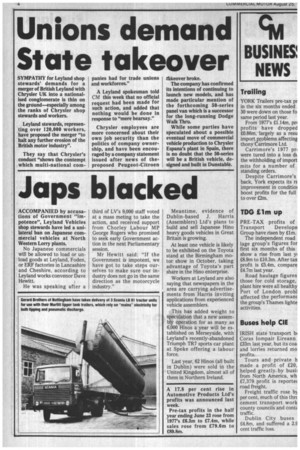Alps blacked
Page 6

If you've noticed an error in this article please click here to report it so we can fix it.
ACCOMPANIED by accusations of Government "impotence", Leyland Vehicles shop stewards have led a unilateral ban on Japanese cornniercial vehicles at North Western Lorry plants.
No Japanese commercials will be allowed to load or unload goods at Leyland, Foden, or ERF factories in Lancashire and Cheshire, according to Leyland works convenor Dave Hewitt.
He was speaking after a third of LV's 9,000 staff voted at a mass meting to take the action, and received support from Chorley Labour MP George Rogers who promised to seek early Government action in the next Parliamentary session.
Mr Hewitt said: "If the Government is impotent, we have got to take steps ourselves to make sure our industry does not go in the same direction as the motorcycle industry." Meantime, evidence of Dublin-based J. Harris (Assemblers) Ltd's plans to build and sell Japanese 1-lino heavy goods vehicles in Great Britain is growing.
At least one vehicle is likely to be exhibited on the Toyota stand at the Birmingham motor show in October, taking advantage of Toyota's part share in the Hino enterprise.
Workers at Leyland are also saying that newspapers in the area are carrying advertisements from Harris inviting applications from experienced vehicle assemblers.
This has added weight to speculation that a new assembly operation for as many as 6,000 Minos a year will be established on Merseyside, with Leyland's recently-abandoned Triumph TR7 sports car plant at Speke offering a labour force.
Last year, 62 Hinos (all built in Dublin) were sold in the United Kingdom, almost all of them in Northern Ireland.




































































































